#deduce
Photo
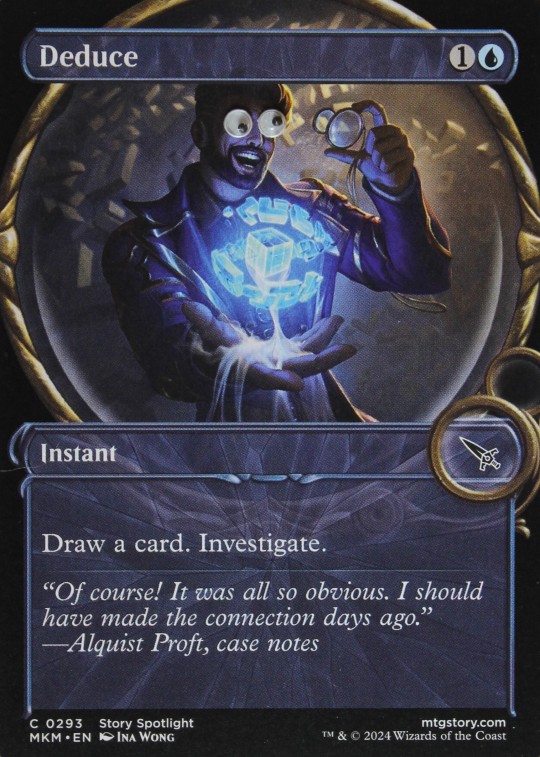
He's just so dang happy he solved it
68 notes
·
View notes
Text
Deduction Tips #16
The size of a bag is indicative of how much a person needs to carry, and usually we prefer to carry less things. When you see someone with a bag (be it a backpack, a purse, or anything else) think about why this person needs a bigger one rather than a smaller one, and what that says about the contents of the bag and the situation of the person carrying it
#deduce#learning deduction#deductionist#deductive reasoning#deduction#sherlock#logic reasoning#observant#observation#profiling#psychology#logic#sherlock holmes#bbc sherlock#sherlock bbc#Sherlockian Deduction#How to think like Sherlock Holmes#study#studyblr#learning#tips#memory#mind palace#microexpressions#criminal minds#the mentalist#house md#elementary#body language
43 notes
·
View notes
Text
Welcome to deducter
For more info, read this page first.
Any interesting cases, problems, or inquiries?
Contact me through the 'Ask Me Anything' page or via email at [email protected]
On my website, you'll discover my simplified deductions—an accessible glimpse into my intricate process of thoughts.
Refrain from requesting the non-simplified version, as it tends to be too complex for most to comprehend.
ND
102 notes
·
View notes
Note
When it comes to the observation weeks in the training program. Could you elaborate on why we shouldn’t deduce then? Is it only about the time when we are doing the exercises?
Hello! great question, i gotta say i didn't write that program, but i did follow it, so i can only give you an answer based on my experience with it and with deduction as a whole. Unfortunately L isn't available to give you the original reason, but if i get in contact with them i'll make a post with their answer.
So, there's this quote from Sherlock which sums up the reasoning behind this very clearly:
"It is a capital mistake to theorize before one has data. Insensibly one begins to twist facts to suit theories, instead of theories to suit facts."
During this stage of the program it is assumed you're coming into deduction as a complete beginner, and therefore that you haven't honed your observation skills yet. This means you'll inevitably be at a point where if you try to deduce you'll be doing so while missing a large amount of information, and fall into the trap of not knowing you're missing information and trying to work with what you have, which leads to often taking big leaps in reasoning to reach conclusions, because you don't have enough data to work with.
This is also why when i teach people i make sure they're at an acceptable level in their observation skills before i move onto other stuff. Later on in the process you learn how to make the most out of a situation where you have little to no information to deduce from. But that's a bit too complicated for a beginner, so it's important that they don't try to deduce until they have a solid grasp on what information they can gather
Aditionally, the training program, as incomplete as it may be, attempts to separate the process of learning deduction into manageable chunks. That program was written during a time where the community was much bigger and everyone attempting to find some way of learning this skill. Everyone was coming up with solutions to their problems and sharing them in the community, and that program is an attempt to solve the overwhelming feeling that comes with trying to learn a massive skill with multiple possible points of entry. It segments it into manageable, organized chunks for people to have a neat way of getting started with deduction, and one of those chunks is just observation, since it's complex enough of a base skill to have its own section
#deduce#learning deduction#deductionist#deductive reasoning#deduction#sherlock#logic reasoning#observant#observation#profiling#psychology#logic#sherlock holmes#bbc sherlock#sherlock bbc#Sherlockian Deduction#How to think like Sherlock Holmes#study#studyblr#learning#tips#memory#mind palace#microexpressions#criminal minds#the mentalist#house md#elementary#body language#answers
13 notes
·
View notes
Text
WHAT PRACTICE MAKES
The good thing about being in robot mode is you get to channel all that into things like old hobbies. Let’s be honest, I’m probably not gonna post in a long time, after this.

So, everyone knows the saying: “practice makes perfect”, and if you hadn’t heard of it, there you go. When it comes to deduction and most things, practice is essential. What you practice is nearly irrelevant. When you practice, getting warmer— consistency is key. However, I wanna talk about how you practice.
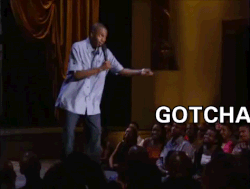
If you’ve circulated the deduction community, you’ll see all these pioneer deductionists who have years and years, maybe even decades of experience. Are all of them good? Not really. A person doing it for 6 months could get better results than them, but why? Why, after all these years are some deductionists still inadequate after so much experience?
The truth is, practice does not exactly make perfect, it makes normal.
These deductionists are practicing incorrectly. They go on reddit or facebook and deduce people, maybe go out in real life and get their material there and simply assume they’re right. They have no confirmation. Now, this may seem a little ironic, but I don’t believe in people getting involved in your process. You only need yourself, and whoever your deducing (or the extension of them, like their belongings). Unfortunately, this means you have to socialize and do research.
Don’t just assume you’re right.
Whenever you’re deducing someone, make sure you have them there, available to confirm and deny.
Don’t just ask what you got right and wrong. Try to explore why it is you were wrong, what set them apart from the baseline.
When you get a lucky, improbable deduction, still ask which factors contributed to this phenomenon. Ask, ask, ask.
How do you ask? Just be as mysterious and ominous, then direct as possible. That’s the 1-2-step. Be enticing and mysterious, then tell the truth. I go on whisper or reddit. I make a post that goes: “I bet you I could tell you who you are by seeing a picture of you or anything you own. NO NUDES OR FOOT PICS.”
Just being honest about that last part. People get confused.
So, what’s the moral of the story? Practice makes normal, perfect practice makes progress. I am coining that and you all have to monetarily compensate me whenever you use that, thanks. This is a pretty short post, but if you have any questions, feel free to ask them. I’ve got nothing going on in my life and I may just throw myself into deduction, who knows? This may be my renaissance, or something.
TDP

#deduction#bbc sherlock#sherlockbbc#deductive reasoning#deductive logico#logicalreasoning#science of deduction#deduce#reasoning#sherlock holmes#mystery
8 notes
·
View notes
Text
At beginner level,
You make observations then deductions, single steps,
And you tell your friends how you get to those conclusions,
And they take a look and say well yeah obviously.
Notice the order here.
It is much easier to check than to notice.
People are non-observant.
Take pride in your "silly" observation.
21 notes
·
View notes
Note
Hello, I am very inspired by your methods. Unfortunately, I am not as smart as you and can deduce without any practice. But you must have developed your ‘deduction skills’ over the years too… it requires a lot of knowledge, does it not? Anyway, getting to the point. To get better at something, not only practice but also feedback ist required. Do you know any sort of ‘game’ or anything to practice deduction? (You know what I mean!) I know the subreddit r/scienceofdeduction which can be helpful sometimes but that depends on the people who upload there. I thought of a game in which you get an item from anyone you’re playing with (you don’t know from whom) and you have to deduce whose it is. Problem is that I don’t have friends/ know ppl who’d do this with me. So any suggestions?
(Disclaimer: English isn’t my first language/ mother tongue/ however you say it)
Of course I had to develop and hone my deduction skills over the years. Even as a child, I already had a certain tendency to know things that other people didn't, but that is probably a family thing, as my siblings were even better at it. To improve my skills I did have to practice, and I learned much from my older brother with deduction games. Everyone has to start at some point and practice to improve. Of course some people are naturally gifted, but even they have to put work into their skills to further improve.
Deducing people based on objects is a good exercise, but maybe you could modify your game idea. Change the game so you do not find the person who it belongs to, but just receive the object itself or a picture of the object and then you have to make deductions about the person based on the object, but not knowing who they are.
A deduction game I could suggest is to deduce someone based on a picture they sent you. Like of their desk, of their room, or a screenshot of their phone screen. I think there are some online groups like you mentioned where people provide such pictures, but be careful to not reveal too much about yourself.
Another possible training ground could be Tumblr, going through people's blogs and deducing them based on what they post.
Going outside and watching people pass by on the street or public transport, deducing them based on what you see, their clothes, their behaviour, et cetera. But sadly you will not be able to find out whether your deductions are correct, except if you walk up to people and ask them. But that does not turn out good in most of the cases, trust me. Maybe Youtube has some useful deduction games and exercises as well.
It is not only important to train your deductions, but also to train your observation and memory. Practice to think fast, make quick observations. Look at a picture for 20 seconds, memorise it, and then try to recount everything you saw. Build yourself a mind palace to be able to store information better, visualise things.
There are endless possibilities of practice, and you can create your own games as well.
Me and some followers played some deduction games about a fictional crime case, by asking 20 questions and trying to solve the case just based on that. Maybe you could also participate the next time.
Good luck with your deduction journey then.
#rp#roleplay#sherlock roleplay#sherlock rp#bbc sherlock#sherlock#sherlock holmes#sherlock holmes rp#sherlock holmes roleplay#sherlock replies#sherlock holmes replies#deduction#the science of deduction#deductions#deduction games#deductive reasoning#deduce#exercise#deduction exercises
15 notes
·
View notes
Text
it constantly boggles me how fans of a show about logical reasoning and deduction often fail to apply those skills to their analysis of the show
(yes this is a deduction post, I do have some ~advice~ at the end)

~
Anderson is the one who mentions "rache."

Anderson is a dick to Sherlock, and Sherlock dislikes him - this is the First Episode and those sorts of character relationships need to be established.
Sherlock does not actually think that "obviously the word in blood is not German for revenge, it's the name rachel" - since he literally considers the German possibility first:

The "obviously" is what Sherlock outwardly portrays to others, specifically Anderson - the scene is of course a nod to the original (while switching it up a bit because that's what adaptations are meant to do) but the scene is also part of a larger plot/episode, and it helps establish the sort of relationship Sherlock and Anderson have. His dismissal of the idea is intentional and who he is dismissing is also intentional for purposes beyond being a nod to the original.
So like, someone might be able to come to the conclusion "bbc sherlock was focused on one upping and not showing love to the original" but not using this scene as an example.
~
If you look at OP's thoughts as a sort of "deduction" about the show/the intents of the writers, we can note a few deduction lessons here:
1. Don't look at something in a vacumn; think about the wider context surrounding something.
Immediate context: Who is Sherlock speaking to? What is going on inside Sherlock's head surrounding his actual dialogue? (since in this show we often have access to that! use everything you have access to with deductions)
How to apply to real life deduction: look at where someone is, who someone is talking to, etc.
You can go further too - the wider context here is this is a TV show: a specific structure that needs to be followed - characters need to be established, conflict needs to happen, etc. (thus it making sense to conclude that Sherlock was written to react that way to Anderson specifically in order to establish that character relationship)
How to apply to real life deduction: the wider context would be like, what country/city is the person in, what is their culture, what is their life like beyond the instance you're observing?
2. Don't jump to conclusions (or jump to throw evidence at a conclusion). Tread carefully!
Sometimes, you might have a potential deduction, based on a few pieces of evidence, but not quite enough information to be sure. So, you look for other evidence (observations, etc.) that could support that deduction.
I don't recommend making that a habit, but if you're doing that, make sure you review the evidence carefully before using it to support your deduction!
Because here, if OP had considered the context of the scene more, OP would have realized that the scene does not support the conclusion.
~
#like there are definitely elements of bbc sherlock that are mainly about one upping the original#but this aint it#tho like#one upping and showing love arent mutually exclusive#and adaptations should be trying to do both#deduction#sherlock holmes#sleuth2k7#deductionist#deduce#learning deduction
12 notes
·
View notes
Text
I may only be a simple shepherd girl from the northern edge of nowhere, but I can still deduce that armies are generally only meant to accomplish one thing.
War.
—Dylan Farrow/Veil
2 notes
·
View notes
Text
Blog post:2
uploaded on June 25, 2022
The game is on!
××××××××××××××××××××××
Deduction battle:
There are two main versions (as far as i know) that can be played.
deduction battle: two or more players look at a object, person, or what have you and each person states their deductions or possibly observations if warrented. Whomever gets the most confirmed deductions correct of course wins the game.
The game played between sherlock and Mycroft is a fantastic example on how it should be played (Both versions). Just with less judgmentalness if your opponent is incorrect or makes a lapse in reasoning.
https://youtu.be/PVLcDTD5gU8
or
https://youtu.be/4V3NOuVctrs
Another version would be
speed deduction:
This should absolutely not be your main form of practice but it is useful in a more casual setting or if your new and need to get in the deduction mindset.
Anyways Speed deduction is the same as battle deduction but without the high need for accuracy.
Two or more players set a timer and each has to make as many deductions as possible. Be sure though to only have a timer that mildly pushes you to be faster. For example if you typically take 5 minutes to deduce then set a timer for 3 minutes.
Also it might be better to write down your deductions or record yourself talking.
There are two reasons for this.
The first reason is to push our boundaries without the fear of being wrong and to become more comfortable with being wrong.
Secondly you can study how your brain behaves when its on a time limit.
When looking over you can look over each phase of your deductions. Such as data gathering, interpreting the data, and our conclusions.
This will allow us to study our snap judgments, biases, how we observe and how our brains analyze data when on a time crunch.
××××××××××××××××××××××
Hypothetical deduction:
Person (A) states a hobby, profession, or a scenario where a situation occurs.
Then person (B) or group (B) states how it could be deduced. For example person (A) chooses "How might hypothetically a violinist be deduced or observed? ". Then person or group (B) might say something like " Violinist tend to have calluses on there left hand, light deafness in their left ear, They might have some rosin on their body or potentially might even smell of rosin".
This is also a way for individuals to use their own personal experience and share them in a organic way. Like for example if you have any experience with the military then you might be able to share info like military "tells" that you may have noticed that could be deduced or observed.
Another benefit that it may lead to some interesting research topics.
××××××××××××××××××××××
Social deduction games:
I'm sure most people have heard of social deduction games so I'm going to make this brief.
Social deduction is a genre of games that require you to read your opponent and to think rationally.
Games like poker, town of salem, mafia, diplomacy and sigh among us
https://youtu.be/vtKMYTF_3Js
would all be examples of social deduction.
Playing these games would naturally help improve reasoning and absolutely improve your body language and or verbal analysis of others.
(Note to self research: research if there's already research either involving multi model analysis, or maybe a conversation analysis of people playing these games.)
××××××××××××××××××××××
Deduction/observation bingo:
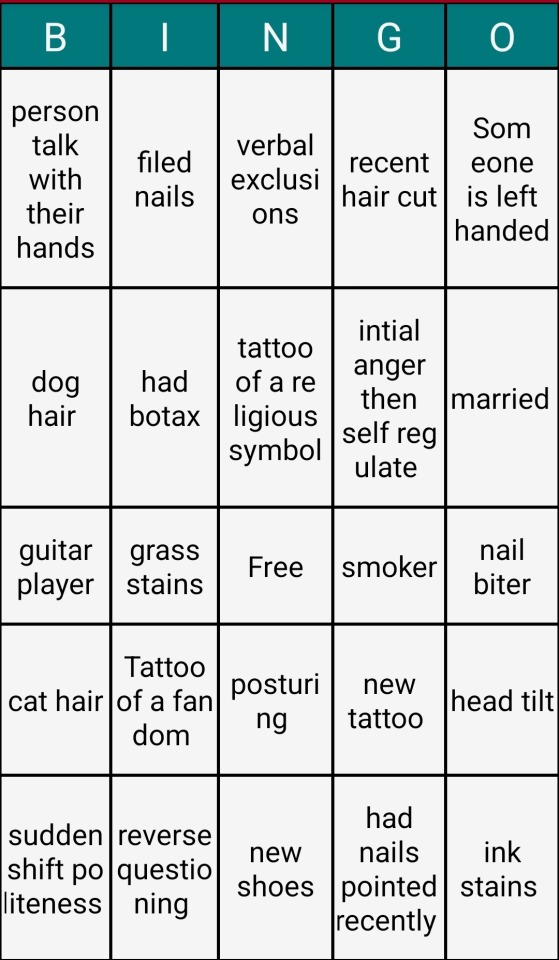
Two versions:
the first way is that you and a group of friends watch the same media. And as you watch you mark off the bingo card. Ideally someone who's is skilled would watch ahead of time and create the bingo sheet. Then you play as you would typically.
(Ideally footage that hasn't been strongly tampered with such as a interview.)
The second method is that you and your group simply go about your days and cross off each bingo square you see. Ideally for each square you mark off you explain stuff like where did you see it, when did you see it, how did you reason and pretty much just explaining the context. Not a requirement of course but it may offer a opportunity for others to learn and to possibly cut back on potential cheating.
××××××××××××××××××××××
Group deduction (Not really sold on the name):
Person (A) researches a short clip (30 second to a couple of minutes) such as a confrontation, or whatever while group (B) watches and attempt to deduce the context and any other information about the individuals involved. Then any corrections would of course be made.
××××××××××××××××××××××
i would like to end this post by saying that these are just what i either use personally to practice or I think might be useful to others.
#the science of deduction#deduction#detective#deduce#deductive reasoning#games#fun#practice#Notsurewhatimdoing#post:2#Deduction content#my posts#2
24 notes
·
View notes
Text
ADDUCE #adduce #synonym #ingles #allege #apply #cite #advance #offer #antonym #retract #except #withdraw #duct #portugues #aduzir #alegar #aplicar #citar #avançar #oferecer #introduzir
ADDUCE #adduce #synonym #ingles #allege #apply #cite #advance #offer #antonym #retract #except #withdraw #duct #portugues #aduzir #alegar #aplicar #citar #avançar #oferecer #introduzir
Inglês: Adduce
Synonyms
Allege, apply, cite, advance, offer, introduce, produce, add, import, name, mention, quote.
Antonyms
Retract, except, withdraw, duct, deduce, suppress.
Português: Aduzir
Alegar, aplicar, citar, avançar, oferecer, introduzir, produzir, adicionar, importar, nomear, mencionar, citar
Thank you for visiting us! Obrigado pela visita!

View On WordPress
#Add#Adduce#Advance#allege#antonym#apply#cite#Deduce#duct#Except#Import#Introduce#mention#name#Offer#Produce#quote#retract#suppress#synonym#withdraw
2 notes
·
View notes
Note
Hi!!! How can deductions be used in day to day life, or like, usefully? And how have you made useful deductions? Sorry if that made little sense
Hi! I see you sent this question in the past two days, i'll gladly answer it, but in case you send any other questions in the future and i don't answer them as quickly i'll inform you that usually all the questions of the week are collected in my inbox and you'd get your answer on a Monday (this week i had some scheduling problems so i pushed it to Wednesday), so if you don't get as quick an answer next time just wait for Monday!
Now, regarding your question! There's many ways deduction can be used in daily life, sometimes it even depends on what you do for a living. For example i know psychologists and other healthcare profesionals have to rely on non verbal communication and information they gather from observation, along with what they're told, since patients can't be relied upon to be transparent and honest all the time, or even know what information is releant to share. In this case deduction can be massively useful.
On a more general note, it depends a lot on the type of relationships you have, i know people who use deduction to interact with their friends, it allows them to know when they're feeling upset or worried, and about what, and act accordingly, all without needing to do more than just glance at them. I know people who use deduction to navigate social situations because they're not good at interacting with people and having the extra information deduction provides helps. Personally i'm someone that introduces deduction into everything i do, from acquiring helpful knowledge when talking to superiors, to knowing what waiter is best to call over at my table cause they've gotten more hours of sleep.
I recommend you watch Sherlock, House M.D., The Mentalist, and all of these deduction heavy shows that sometimes showcase how these characters use their skills casually, it's really not much different than what you see there. If you want a blog that really goes into casual uses of dedduction i'd check out @froogboi 's blog, it's full of everyday life uses of deduction
#deduce#learning deduction#deductionist#deductive reasoning#deduction#sherlock#logic reasoning#observant#observation#profiling#psychology#logic#sherlock holmes#bbc sherlock#sherlock bbc#Sherlockian Deduction#How to think like Sherlock Holmes#study#studyblr#learning#tips#memory#mind palace#microexpressions#criminal minds#the mentalist#house md#elementary#body language#answers
22 notes
·
View notes
Text
Culturing Bacteria in a Petri dish With Agar; an experiment/observation

Today's post is quite different from the usual;
So, we had to do a project in the educational institution I study in; Which was growing bacteria in a Petri dish with agar.
Today, the results came in, but our professor insisted that we have to throw the dishes in the bin. I didn't give up there; after talking to her for a short amount of time, she accepted that I can take the dish with me to my flat, and have a look at it with microscope.
I still cannot comprehend why other students were disgusted by them; they are beyond wonderful.
Allow me to explain this astonishing journey:
What exactly is agar?
Well, agar, derived from the minute aquatic organism known as seaweed or algae, specifically the types Gelidium or Gracilaria, is a widely employed gelling agent. Found abundantly in the coastal regions of East Asia, particularly Japan and South Korea, it undergoes a process of cleaning and extraction to obtain agar in its usable forms of dry strips, flakes, or powdered consistency.
Now, when it comes to the realm of cell and bacterial culture, agar assumes a pivotal role as a solidifying and gelling medium within culture media. Its remarkable gel-forming properties allow for the creation of a three-dimensional matrix, offering an ideal environment for the growth and sustenance of cells and bacteria alike. Nutrients and metabolites find efficient transfer within this agar-based culture medium, while its structural integrity ensures the confinement of cells to designated areas.
Agar's utilization in cell and bacterial culture provides a multitude of advantages, including its ease of implementation, stability, and facilitation of cell separation procedures. The versatility of agar finds application in diverse fields, from microbiology to biotechnology and pharmaceutical industries.
Bacteria can be found on any surface, anywhere.
I decided to pick them up from my shoe soles.
After extracting bacteria from the soles of the shoes, I cultured them in an agar-containing Petri dish. After one week, I observed bacterial and fungus growth in this environment. Here are some images I captured with my microscope:

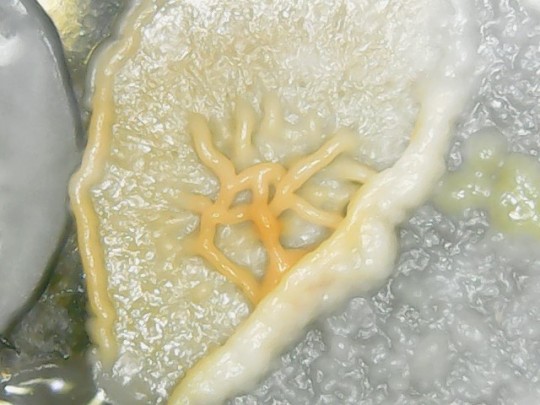

Wonderful, aren't they?
ND
#bacteria#fungus#deduction#tumblr#deducter#deduce#deductive reasoning#science of deduction#tumblrpost
41 notes
·
View notes
Note
Greetings @amateur-deductions
What are your Go-to advice for for those who start becoming a deductionist and just finished learning body language?
Appreciate Your reply
Bless you all and have a good day.
Hello! Sorry for the delay, i've been on a hiatus since Christmas.
So if you're coming from having learned body language already you have a bit of a head start compared to people that are starting fresh, since you probably have already learned to be more observant, to be constantly aware of things like body movements and facial expressions, and to intepret these things and process them as you take them in. I would say this means you can put a bit less time into the observation practices beginners usually have to go through, and you can dedicate more time to practicing reasoning and logical thinking
I would also say you have the option to approach deduction using your body language background. Something you start to realize as you get better at deduction is that everyone has cultivated different skills they use to extract information, some people use raw logic reasoning, some use extensive psychology knowledge, and some use extensive knowledge in body language and facial expressions, and there's nothing wrong with any of these methods, they're simply what you could understand as different "specialties".
So i would advice that you don't try to learn deduction as a separate discipline than body language, but rather use your body language knowledge, coupled with anything you learn in the field of deduction, to enhance your conclusions
This does come with a disclaimer though. Make sure that you're not leaning into your body language knowledge so much that you're avoiding doing the exercises and learning the methods that are core to deduction simply because body language provides an easier path, since you're well versed in that already
#deduce#learning deduction#deductionist#deductive reasoning#deduction#sherlock#logic reasoning#observant#observation#profiling#psychology#logic#sherlock holmes#bbc sherlock#sherlock bbc#Sherlockian Deduction#How to think like Sherlock Holmes#study#studyblr#learning#tips#memory#mind palace#microexpressions#criminal minds#the mentalist#house md#elementary#body language#answers
12 notes
·
View notes
Text
How To Get Accurate But Interesting Deductions
Note: I’m working on…working on a little project on deduction, I think it’ll be pretty interesting, once finished. It’s a pretty laborious one that requires the collection of information and a lot more bullshit, so…you probably won’t be seeing that, anytime soon.

Okay, so back to the topic: How to get accurate but interesting deductions. This is very broad. Honestly, I chose this title because I knew that the kind of people who’d be attracted to it would probably be the ones who need to hear it. Some phrases these people may use while reasoning:
“Because they’re an idiot”
“Because they want to impress potential romantic partners”
“Because they’re slow”
“Because they’re shallow”
“They’re mentally unwell *insert mental illness here*”
If you find yourself saying these things, then you probably need to read this post. Humanization: it’s important. I’m not here to be the morality police, or whatever— it’s just a fact.

Do you want to stop getting the same, surface level, inaccurate, blanket statement deductions? Then deduce people, not a version of your projections. If you haven’t guessed, I lean more towards the psychological aspect of deduction, and I’ve gathered that humanizing the people you deduce will help you psychologically profile them.
The thing is, deductionists sometimes underestimate or dehumanize the people they’re deducing. Whether they do it to feel better about themselves, to force a more interesting story onto their person in order to come up with more exciting conclusions, or whatever they’ve got going on, doesn’t matter. The point is, they don’t think other people are allowed to be intelligent, or substantial and interesting.
As a deductionist, one of the worst things you can do is judge the person you’re deducing. It’s not your job to judge them, you’re supposed to be analyzing them.
Your projections and clumsy methodology will only get in the way of that. When you deduce them, give your person a chance. Give them as much justice as you would want to be done onto you. If you want accurate deductions, then actually treat people like…people. Look for meaning in everything, then just discard the ones that don’t fit into the picture— it’s better than missing a piece.
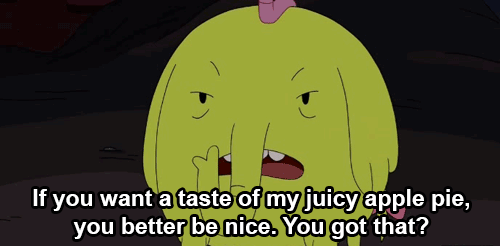
For example, a person I was deducing, along with others, had an old blanket with cartoons on it. Here’s how one person went wrong:
Cartoon blanket—> immature, possibly autistic/ADHD, not many friends.
Can’t they just be young or sentimental?
Either attached to childhood, looking for comfort, or financially unstable?
No books—> stupid, shallow, immature.
E-books are a thing. His book could’ve been in his locker, at school, or hell, in his backpack in another room.
Shoes inside the room—> messy, no parents at home, slob.
Could be, or it could be a matter of convenience. It could be a matter of routine. Or, he could have extracurriculars and has to be somewhere, after. He could have a social thing, which would go against the whole “no friends, loser” thing.
When you deduce someone, treat it like a courtroom inside your head. There are two attorneys, the defense, and the prosecutor. One person looks for meaning, stretches and bends over backwards to redeem your person, while the other just goes buckwild and absolutely shits all over their little head. It’s called balance.
People are allowed to be as smart and interesting, maybe even moreso, than you. People are allowed to be complex.
Anyways, I know I neglect this blog a lot. In my defense, you hit a certain plateau, when you’ve been deducing for a while. I don’t know when I’ll upload again, but…ya’ll eatin’ today. Bye.

23 notes
·
View notes
